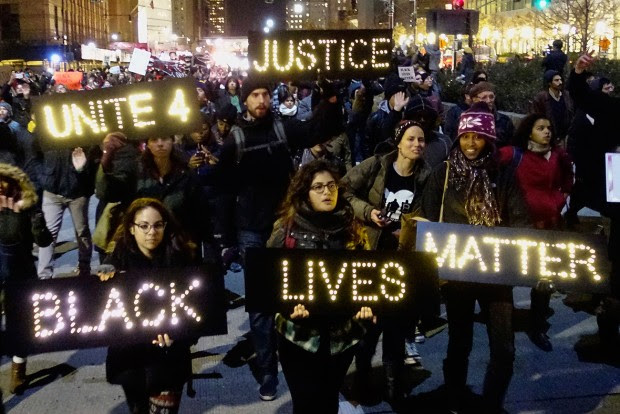
A Week of Significant Victories
This week #BLM had two major victories in local elections, where prosecutors who mishandled cases involving police killings were removed from office. In Cook County, IL, challenger Kim Foxx defeated the two-term state’s attorney, Anita Alvarez, by 30 points. It took Alvarez a year to indict Chicago police officer Jason Van Dyke who shot Laquan McDonald 13 times. It was not until a suppressed video was made public that she finally took action.
And, in Cleveland, Cuyahoga County prosecuting attorney Timothy McGinty was unseated by Michael O’Malley, a former deputy county prosecutor, by almost 10 points. McGinty failed to indict the police involved in the fatal police shooting of Tamir Rice, a 12-year-old African American boy who was playing with a toy gun in a park.
These elections should send a message to prosecutors throughout the country that the failure to hold police responsible for their violence is likely to cost them their jobs. Activists who worked on these campaigns also hope it will lead to new prosecutorial policies that will stop the overcharging and incarceration of African Americans.
Also this week, the City Council of Ferguson reversed itself and accepted US Department of Justice changes to the way its police, prosecutors and courts act toward African Americans. Among the changes will be police body cameras, de-escalation policies, diversity training and an independent monitor. As of February, Ferguson had a 4-2 majority black city council for the first time in its history.
And, in Los Angeles the LA Police Commission issued a report that called for the police to stop their killings. They want to see de-escalation practices used by the police. Melina Abdullah, an organizer with Black Lives Matter-L.A., said “the willingness of the commission to even speak to this was a result of the organizing of [Black Lives Matter-LA] and their allied organizations. The groups have been going to the police commissions meetings every week, with some members being ejected and arrested.” She said the report did not go far enough to the transformational change that is needed.
Also, this week #BLM showed its organizing power by shutting down a rally for Donald Trump in Chicago, which led to Trump events in other cities being cancelled. Trump has angered large segments of the public with rhetoric that many see as racist and sexist. In Chicago, students associated with #BLM and other issues organized a mass protest outside and inside the rally. The students planned to disrupt the event but the turnout for the protest was so large that Trump cancelled it.
And police who seemed to look the other way at a Trump rally in North Carolina where an African American man was sucker punched in the face, were disciplined. Three of the deputies were demoted and suspended for five days each without pay for their unsatisfactory performance while two others were suspended for three days. The perpetrator of the attack, Fayetteville’s, John McGraw, a 78-year-old white Trump supporter, was arrested on a misdemeanor assault charge for the attack.
We have reported on other protests by #BLM where they interrupted Senator Bernie Sanders, fmr. Secretary of State Hillary Clinton and fmr. Governor Jeb Bush. The #BLM has injected the issues of police violence and mass incarceration into the presidential race with their ongoing efforts.
These are all signs of a movement getting stronger as none of this would have happened without the existence of citizens standing up together demanding their rights under the resounding call that black lives do indeed matter.
Deep Problems Still Persist, More Is Needed
These victories for #BLM and their supporters are notable but problems still persist and the movement must continue to grow and get stronger.
A report this week found that federal prosecutors declined to indict police 96% of the time. The Pittsburgh Tribune’s six-month review found 12,703 potential civil rights violations were turned down nationwide out of 13,233 total complaints from 1995-2015. For all other crimes, prosecutors rejected only about 23 percent of complaints.
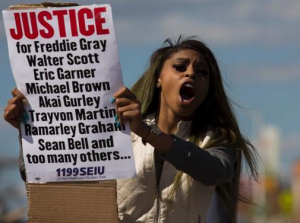 Baltimore resident Caira Byrd encourages passing cars to honk while she protests near the wake of Freddie Gray on April 26, 2015.
Baltimore resident Caira Byrd encourages passing cars to honk while she protests near the wake of Freddie Gray on April 26, 2015.
And, in Freddie Gray’s neighborhood in Baltimore police abuse is rampant. A survey conducted by Baltimoreans United in Leadership Development and the No Boundaries Coalition found 453 out of 1,500 survey respondents in Sandtown-Winchester had experienced or witnessed “police misconduct.” However, the fear of police in the neighborhood led to only 39 people willing to go on record about the police behavior.
It is not only police abuse that are a problem in African American neighborhoods, but basic necessities are not provided. This has become evident in the wake of the Flint water crisis. This week hearings were held in Congress where Michigan Governor Rick Snyder finally testified along with EPA Administrator Gina McCarthy. Both made major mistakes – gross negligence would not be an unfair charge – in how they handled Flint’s water and at the hearing members of Congress urged both to resign.
Snyder and his Flint emergency manager’s negligence are well known, but at the EPA Miguel Del Toral. a regulations manager for the agency, was investigating Flint’s water for more than a year and blew the whistle. The response – he was punished by the EPA.
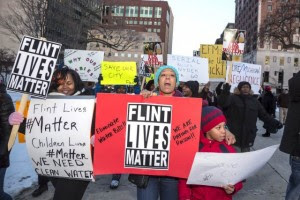 Protest in Flint over lead in the water.
Protest in Flint over lead in the water.
Water is not just a problem in Flint, although the emergency manager switching from a safe supply to an unsafe one makes that case different. A multi-part USA Today investigation published this week identified almost 2,000 additional water systems in all 50 states where testing has shown excessive levels of lead contamination over the past four years. Among their findings: 350 schools and day-care centers failed lead tests a total of about 470 times from 2012 through 2015. Freddie Gray’s schools in Baltimore included lead poisoned water and that no doubt added to his struggles in life. Water quality is a national crisis, a major part of the crumbling infrastructure of the United States but is barely on the national agenda.
The Flint water crisis and problems in Detroit have also shown the failures of non-democracy and privatization on public services like the water supply. While Detroit has seen massive shut-offs of water to poor residents (while big businesses do not pay their bills and are not punished), they have also seen the destruction of the school system by thieving emergency managers who have misused school funding.
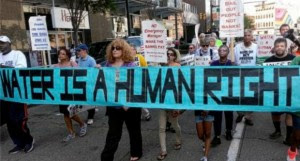 Detroit protest: Water is a Human RIght
Detroit protest: Water is a Human RIght
There are surprising reasons for city debt around infrastructure like water. In Baltimore, during the same time period that Freddie Gray was killed, thousands of poor residents were having their water shut-off. Water rates have dramatically escalated in recent years and some people cannot keep up with the cost of this basic necessity. But, the little-discussed cause of infrastructure cost is that Baltimore has given tens of millions to Wall Street to pay for toxic interest rate swaps. These toxic swaps are complex financial instruments that banks pitch to government entities—often without proper explanation of the risks involved—as a way to save money on infrastructure projects. By the summer of 2015, Baltimore had paid banks nearly $56 million in interest payments just for water and wastewater swaps, and another $43 million in penalties. Wall Street steals from cities and poor residents pay the price.
 Protest by Free Your Voice at the former chemical plant near Curtis Bay where an Albany company wanted to build a trash-burning power plant. (Fern Shen)
Protest by Free Your Voice at the former chemical plant near Curtis Bay where an Albany company wanted to build a trash-burning power plant. (Fern Shen)
Water pollution is one form of environmental injustice which often exists in communities of color. Putting toxic plants, incinerators, pipelines and other poisonous pollution near communities of color is also all too common. This week in Baltimore a community, led by students, had a victory in a multi-year campaign to stop a toxic incinerator from being built less than a mile from their high school.
Another problem across the country is the underfunding and privatization of schools. This week, a group of Boston teenagers organized a mass district-wide protest against austerity. Students in Puerto Rico shut down a university over austerity cuts. And, Chicago teachers are preparing for a mass day of action – a general strike – on April 1 over inadequate school funding. Across the country teachers, parents and students are protesting the direction education is taking, especially in communities of color.
In this era access to the Internet is essential for participating in the economy whether it is running a business or purchasing items in inexpensive ways or basics such as filling out a job application, completing homework or applying for government services. A recent Pew Survey found that access to the Internet is dropping among blacks and Hispanics. As Joseph Torres and Steven Renderos of Free Press write: “The digital divide in cities like these has contributed to the growing inequity within society.”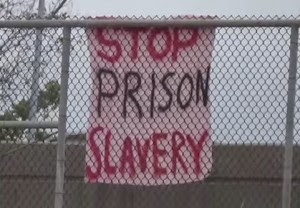
The United States is the largest prison warden in the world. With 5% of the world’s population the US has 25% of the world’s prisoners. But, to make this even more of a problem, the racial injustice of US society is seen in how prisoners are mistreated, kept in overpopulated prisons and used as a new form of slave labor. In the last two weeks there were two mass prison uprisings in Holman Prison in Alabama. Prison uprisings have occurred in multiple states in recent years.
Ending Racism and White Privilege is a Marathon Not a Sprint
The issues of police violence and racial injustice when it comes to education and the economy is as old as the beginning of slavery in the 1600s. It has remained a problem through slave uprisings, the founding of the United States, the abolition of slavery, Jim Crow, lynching, segregation, red lining and neglect of black neighborhoods and urban areas more broadly. Despite having an African American president and attorney general, these issues have not gone away and activists are putting them on the political agenda.
 Joe Louis and Neil Scott help Isaac Woodard up a set a stairs soon after a beating left him blind. Ossie Leviness/New York Daily News
Joe Louis and Neil Scott help Isaac Woodard up a set a stairs soon after a beating left him blind. Ossie Leviness/New York Daily News
This month was the anniversary of a police violence case from February 1946 that shocked the conscience of the nation and was a precursor to the growth of the Civil Rights movement that reached full force in the 1950s and 60s. It was the case of Isaac Woodard, a 26-year-old black Army veteran who boarded a bus in Augusta, Georgia to see his wife in South Carolina after being honorably discharged. In route to going home he was beaten and arrested by Georgia police. He was hit in the face and eyes so aggressively that not only did he become unconscious but when he woke up he was blind.
The NAACP took on his case and got it in front of Orson Welles who had a weekly radio show. He did a series of broadcast commentaries on the case, which got the attention of millions, including President Truman resulting in a federal indictment of the sheriff. After a trial, which was obviously thrown by the federal prosecutor, the sheriff was found not guilty. The judge in the case was horrified, changed his views on race issues and issued a ruling in 1951 finding school segregation to be per se unequal and therefore unconstitutional. That case along with four others made it to the Supreme Court as part of Brown v. Board of Education which ended school segregation in 1954.
An incident of police violence in 1946, which led to an unjust acquittal, in the end led to the end of school segregation.
 Dorothy Counts-Scoggins became the first black student to attend the all-white Harding High School in 1957. Photo: GETTY IMAGES/THE CHARLOTTE OBSERVER/HUFFPOST ILLUSTRATION.
Dorothy Counts-Scoggins became the first black student to attend the all-white Harding High School in 1957. Photo: GETTY IMAGES/THE CHARLOTTE OBSERVER/HUFFPOST ILLUSTRATION.
In Charlotte, NC in 1957, fifteen-year-old Dorothy Counts-Scoggins, was the first African-American to desegregate Harding High School. As she walked into the school she was spat on, trash was thrown at her and she was told to “go back to Africa.” Inside, a group of boys surrounded her in the cafeteria and spat in her food. Other students threw a sharp object at her head while she was facing her locker. Police officials told her worried parents they could not guarantee her safety. Police did not protect her and teachers ignored her.
Today, at age 73, she is at the forefront of a debate about whether recently re-segregated Charlotte-Mecklenburg schools should integrate classrooms along socioeconomic lines. She is retired from a long career as a preschool teacher and travels to communities to talk about school diversity. The school board is considering a new plan to decrease the number of schools with high concentrations of poor students. She is still working to convince the community to support socioeconomic diversity.
Ms. Counts-Scoggins epitomizes the reality of the nature of the work that today’s #BLM is engaged in. There are no quick fixes to a country that is crippled by its history of racism. We must all recognize that the work we are doing for racial, economic and environmental justice requires us to be persistent and uncompromising. The national consensus is growing in our favor, our work is ensuring that it advances, but it will not be a short term protest or a single election that will achieve the transformational justice we seek – it will be a long term campaign that will last our lifetimes – a marathon and not a sprint.

















